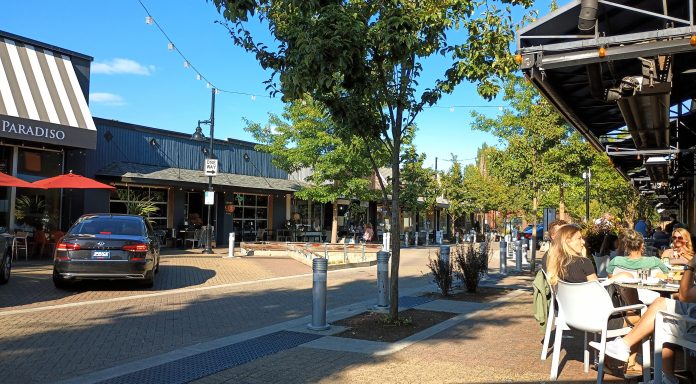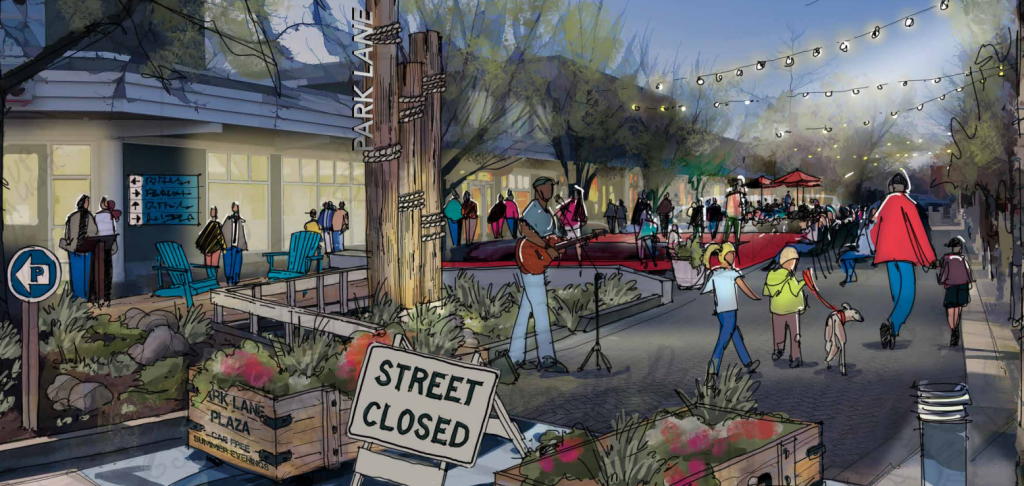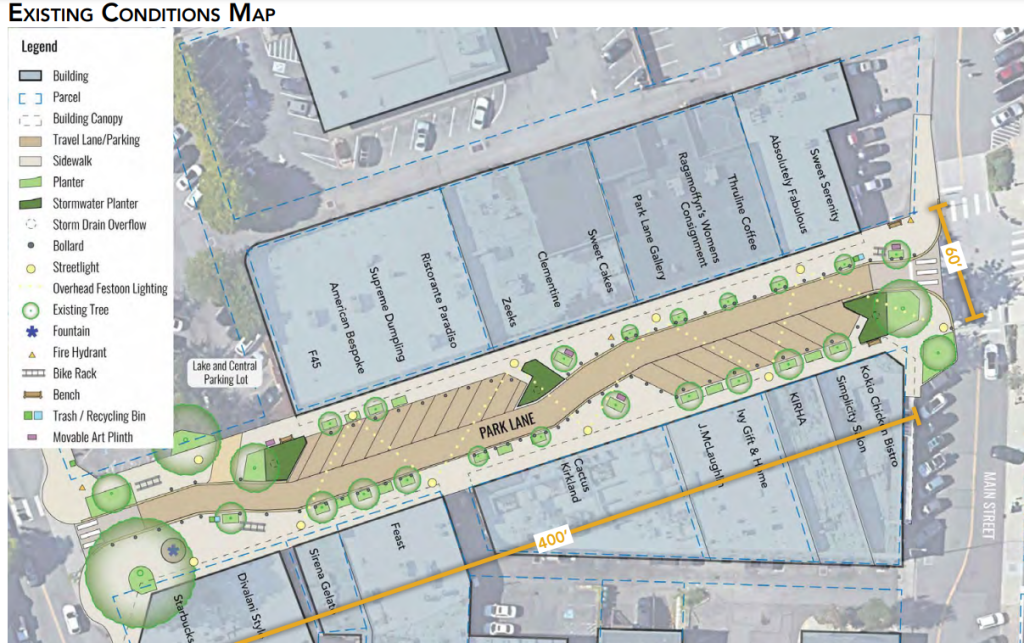
The Kirkland City Council this week voted to hit pause on pursuing options that would convert a stretch of Park Lane in downtown Kirkland into a pedestrianized street closed to motor vehicles for at least part of the year. The unanimous vote Tuesday night came after the council had allocated funding to hire a consultant to look at the feasibility of making upgrades to the roadway that would allow closure to traffic either temporarily or permanently.
The consultant report, delivered earlier this summer, outlined three potential paths forward: a full time, year-round people street on Park Lane, a summer-only people street, and a people street just on evenings during the summer months. All three options came with a fairly significant price tag, both in one-time spending and ongoing costs related to staffing and maintenance. Construction cost estimates to change the street’s layout were estimated at up to $2 million for summer evening option and up to $3.4 million for the year-round option, and ongoing costs ranged from $25,000 per year to $225,000, in addition to one to two additional full-time city employees to manage the program.

Instead of moving forward with a standalone city project to revamp Park Lane, Kirkland will explore a future vision for how the street will operate as part of the major update to the city’s Comprehensive Plan, due next December.
“I think this is a good time to pause, take a step back, and bring the community along, and really engage the entire community on what we want for the future,” Councilmember Amy Falcone, one of the council’s strongest voices for pedestrianization on Park Lane over the past year, said ahead of the vote.
Apart from costs, push back on the entire concept of pedestrianizing Park Lane was fairly substantial, with a number of business owners along the short stretch of street citing a potential for significant disruption to their business models if the city were to move forward with cutting off access to Park Lane and its 17 parking spaces to vehicle traffic. In July, a townhall hosted by the city brought out dozens of people to ask questions about the results of the consultant report, including residents who supported opening the street to pedestrians and business owners, like Tina Moody, owner of the Absolutely Fabulous consignment shop, who has cited concerns about lost revenue during times when the street’s focus shifts away from direct business access.

The same month as the town hall, the council was presented with a petition signed by more than 1,000 people opposing “a permanent or seasonal closure of Park Lane.” “We feel the removal of all parking as well as accessibility will put dozens of businesses in jeopardy of closing,” it stated. But only around a third of the signatures were from Kirkland residents, with a sizable contingent of the signatures from cities far away from Kirkland, city staff noted. The most recent poll focused on city residents, conducted in the spring of 2021, found around two-thirds support a full pedestrianization of Park Lane, with only a tiny fraction supportive of doing nothing.
“This has been pretty divisive, and I’ve been pretty disappointed by the divisiveness of some of the input we’ve received,” Councilmember Falcone said Tuesday night.
A number of the councilmembers cited work Kirkland city staff did to look at case studies in other peer cities as being a deciding factor in supporting a pause right now. Those examples included places like Burlington, Vermont, which levies a fee on businesses along pedestrianized Church Street to fund programming, making it a self-funded city department. Kirkland, by contrast, doesn’t have the level of buy-in from neighboring businesses that would allow the city to move forward with a large project like the ones laid out in the consultant report, councilmembers said.

“What was really clear for me from those case studies is that to do this well, it requires significant staffing, money, and support,” Councilmember Kelli Curtis, who ultimately made the motion to cease work on Park Lane for right now, said. “I have to go back to, where can we spend that $3 million to $4 million dollars in a better place. We have so many programs, we have our active transportation plan. The stores-to-shores greenway will be a $1.3 million investment… the $3.5 million we would take for this project, we could do two additional greenways.”
By shifting focus away from the conversation around Park Lane, several councilmembers argued they could now prioritize bigger issues. “This doesn’t change my opinion about modal priorities across the city,” Councilmember John Pascal said. “I firmly believe that we must continue to invest in making our facilities safer for walkers, bikers, and transit riders.”
But Pascal cited the fact that transportation maintenance costs have continued to outpace available funding as a reason that the city should not pursue additional projects that would add to that deficit. “Our streets and our pavement are continuing to decline, and until we address that, it’s really hard to put more maintenance dollars or maintenance staff that are dedicated to something like this, when we have streets that are falling apart,” he said.
Last year, Kirkland adopted a $20 vehicle license fee that includes a small annual allocation to street maintenance, but the lion’s share of that funding goes toward adding new sidewalks and crosswalks, with a small budget for upgrades to existing painted bike lanes.
“What we need to do is take a step back, look at our comp plan, our transportation plan, and that’s where we have this conversation,” Councilmember Curtis said. “We look at it holistically from Marina Park, Park Lane, downtown core, Peter Kirk, Kirkland Urban, and the [NE 85th Street] station area plan, and we look at our big picture vision,” she said. “I feel like we don’t have the resources, staff, money and time to do this well, and I think we should end the discussion on closing Park Lane.”
Councilmember Toby Nixon, the only councilmember to vote against allocating any city funding to look at the future of Park Lane, urged those who were involved in the issue to stay active in the broader conversation.
“This is not a final, unchangeable decision for all time by the council. It is a deferral of consideration of changes at Park Lane to be considered as part of the larger visioning of downtown,” Nixon said. “It’s critical that everyone remain engaged… people need to change tactics from what has been done with petitions and emails… to being engaged in the comprehensive planning process.”
One thing is for sure: While the debate over what to do with Park Lane may be officially on pause, it’s certainly not dead.
Ryan Packer has been writing for The Urbanist since 2015, and currently reports full-time as Contributing Editor. Their beats are transportation, land use, public space, traffic safety, and obscure community meetings. Packer has also reported for other regional outlets including BikePortland, Seattle Met, and PubliCola. They live in the Capitol Hill neighborhood of Seattle.

